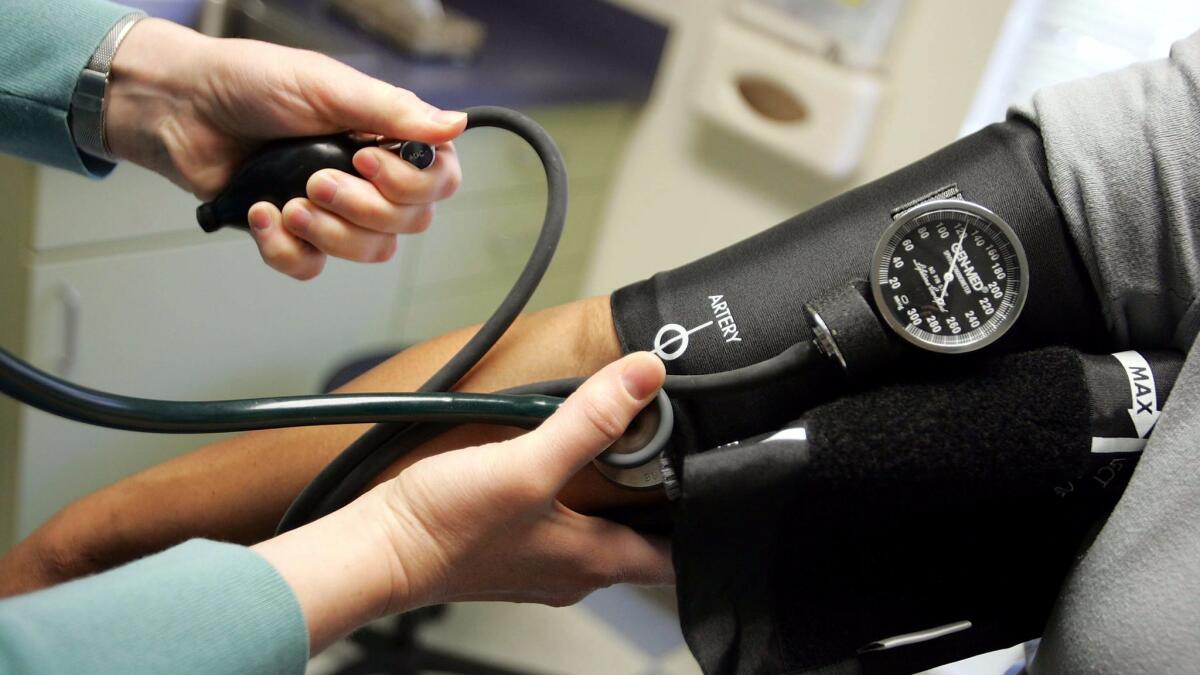Here’s what primary care doctors really think about Obamacare

- Share via
A post-election survey of primary care physicians reveals that a majority of the doctors who first treat most Americans do not support some of the GOP’s most widely circulated plans to repeal and replace the Affordable Care Act.
Conducted in December and January and published online Wednesday in the New England Journal of Medicine, the new survey shows that nearly three-quarters of general practitioners favored making changes to the Obama administration’s signature healthcare reform measure.
But in this nationally representative sample of primary care doctors, only 15% favored the law’s repeal. Among responding physicians who voted for Donald Trump, only 38% favored the law’s repeal.
That makes the repeal of the Affordable Care Act, also known as Obamacare, far less popular among the physicians on the front lines of medicine than it is in the American body politic. A Kaiser Family Foundation poll taken after the November 2016 election found that 26% of Americans wanted to see Obamacare repealed.
Like President Trump, primary care doctors were aligned solidly behind a continued guarantee of access to insurance irrespective of patients’ preexisting conditions (95.1% approved). And a broad majority (87.6%) said they supported a provision of the healthcare law that allows young adults up to 26 to stay on their parents’ insurance plans.
Beyond that, however, the survey uncovers scant support for many proposals that have emerged as leading Republican alternatives to the healthcare law’s provisions. As lawmakers debate the details, many of their proposals would shift healthcare costs toward patients, pare some benefits and extend less financial help for many who could struggle to afford insurance coverage.
But among primary care docs, just 29% expressed support for measures that would expand the use of health insurance plans with high deductibles.
Some 42% of respondents said they oppose further deregulation of private insurance markets. Among the most visible GOP deregulation proposals now circulating is a plan to allow insurance companies to sell policies across state lines.
And 58.6% expressed support for tax credits to help Medicaid-eligible people purchase private insurance policies.
Among the survey’s most striking findings was strong support for an extension of the Affordable Care Act that is absent from any GOP proposals: Two-thirds of primary care physicians endorsed the idea that any healthcare reform should include a public insurance option resembling Medicare that would compete with private plans.
Study coauthor Dr. Craig Evan Pollack, an internal medicine specialist at Johns Hopkins University School of Medicine, said he was struck by the strength of physicians’ opposition to measures that increased complexity and shifted costs toward patients. He suggested it was a direct result of doctors’ experience in caring for patients.
“As physicians, we see people struggle with out-of-pocket costs, deciding which types of care they’re able to afford and making very challenging decisions,” said Pollack. Primary care physicians, he added, “try to advocate for their patients.”
The new survey reflects the answers of 426 physicians drawn from a master file of the American Medical Assn. and is considered a nationally representative sample. Its findings appear to mark a significant shift in physicians’ opinions about the Affordable Care Act. In the opening months of 2015, 48% of primary care physicians had a favorable opinion of the Affordable Care Act and 52% viewed it unfavorably.
Dr. David Grande, an internal medicine physician at the University of Pennsylvania’s Perelman School of Medicine, said that as the Affordable Care Act got up and running, virtually all of his colleagues have treated new patients who had previously been uninsured or who struggled to hold on to insurance.
The possibility of the ACA’s repeal in 2015 “was hypothetical — it was political rhetoric,” said Grande. “This is no longer hypothetical; the threat is quite real. And the idea of repeal is something that makes primary care physicians nervous,” he added.
The Congressional Budget Office has estimated that if the law is not replaced, 18 million Americans would lose or drop their health insurance in the first year after the ACA is repealed, and as many as 32 million more would drop off the rolls over the next 10 years.
The survey did reveal one respect in which primary care physicians mirror many Americans’ distrust of the Affordable Care Act. Just under half — 49.5% of the physicians surveyed — expressed support for tax penalties for individuals who do not purchase health insurance.
That “universal mandate” is the mechanism the ACA used to ensure that young and healthy people join the insurance pool and help offset the costs of the pool’s sickest participants, spreading the costs of care. The finding that fewer than half of doctors support the mandate underscores the “important need to educate healthcare providers and the public about the fundamental inseparability of these provisions,” the authors wrote.
Grande said that physicians’ tepid support for a universal mandate is stronger than that in the general public, indicating that “they probably understand that connection” a little more than some. “But health insurance and policy is very complex for consumers and for physicians as well. So I’m not terribly surprised,” he added.
Follow me on Twitter @LATMelissaHealy and “like” Los Angeles Times Science & Health on Facebook.
MORE IN SCIENCE
Death rate from cancer down 20% since 1980, but clusters of high mortality remain
Fossil hunters discover an ancient iguana that lived in a dinosaur nesting site in Montana
Did jet lag cost the Dodgers the 2016 National League pennant?




